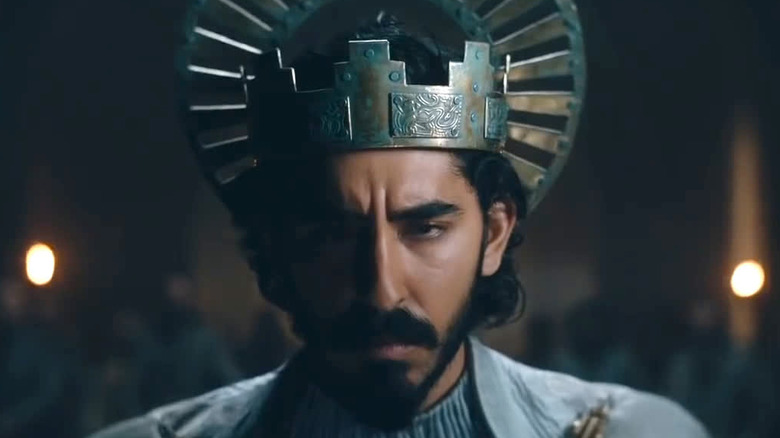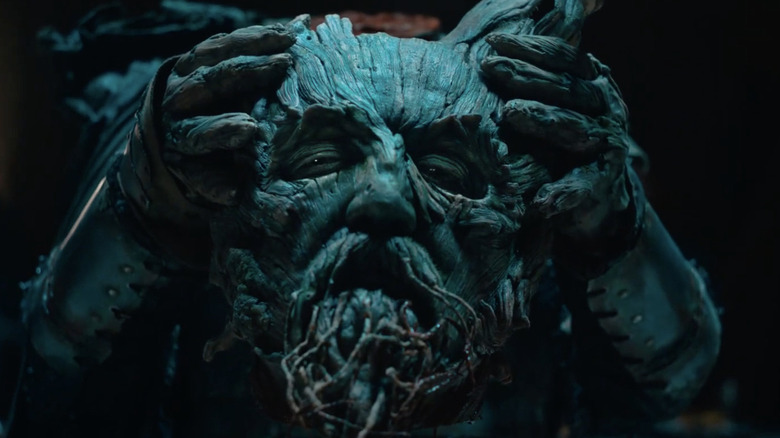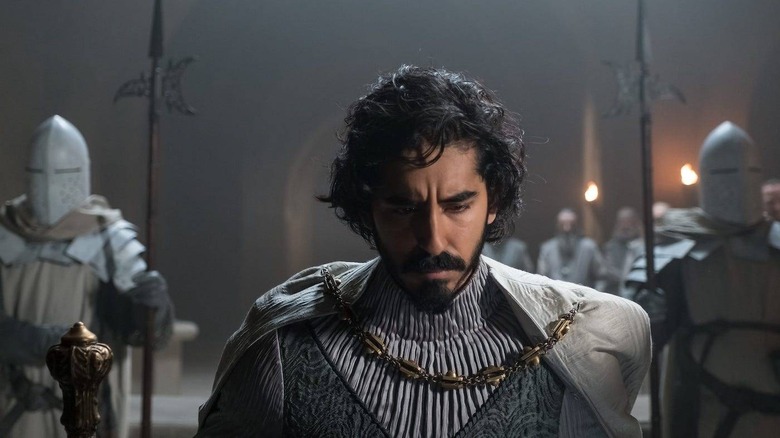The Ending Of The Green Knight Explained
"The Green Knight" is a fresh take on the classic hero's journey. It's an odyssey — in the sense that it involves a long adventure, and also in the epic, Homeric sense. Like with so many heroic odysseys, "The Green Knight" is many things, but, above all else it is this: extremely and incontrovertibly weird.
There are magic spells, ghosts, giants, spiritual foxes, and nightmarish fates. What in this supernatural world is real, and what is the imagining of our hero Sir Gawain (Dev Patel)? The answer to that isn't immediately or easily illuminated. Similarly, even the way the story ends seems almost shrouded in mystery. Not to worry, though — we can work the strands of this strange tapestry together until they weave a pattern that at least makes some semblance of sense.
Let's begin at the beginning, because working out the basics is absolutely essential for understanding the complexity of what happens later. "The Green Knight" is the tale of a young man named Gawain, who just so happens to be the son of Morgan le Fay (Sarita Choudhury), and, thus, the nephew of King Arthur (Sean Harris) and Queen Guinevere (Kate Dickie). "The Green Knight" never uses these names (other than Gawain's), but as the tale is based on the 14th century chivalric romantic epic "Sir Gawain and the Green Knight," we can make some inferences. And, to be sure, part of understanding the ending is knowing who these characters are in historical context.
To be or not to be, that is Gawain's question
Gawain leads a free, uneventful life full of wine, women, and song. He seems to spend more nights in the bed of one woman in particular, Essel (Alicia Vikander), who dreams of being his lady in the courtly royal sense.
But it's not until Christmas Day that the die is cast. King Arthur invites Gawain to sit with him and Guinevere while they discuss the possibility that Gawain might someday have knightly tales to tell. Gawain's mother summons the titular Green Knight, who challenges all knights in the hall to cut him with his own axe, and, in exchange, have the same wound visited upon them by the Green Knight in a year's time. Gawain accepts the challenge and, thinking he's solved the situation, chops the Green Knight's head clean off.
But the Green Knight is no mere mortal, so he picks up his own head and rides away, laughing all the way in the knowledge that he will kill Gawain in a year's time. This moment is so important because it tells us what this incarnation of Gawain is all about. There are many fictional accounts of Gawain which portray him at times as noble and at other times as graceless, callow, and utterly dishonorable.
"The Green Knight" portrays Gawain as a man manipulated too easily by his own ambition. This Gawain wants to be have songs sung of his gallantry and he wants people to see him as honorable. However, from the outset, he seems more interested in perception and power than he does with the actual responsibilities of knighthood.
When Gawain arrives, one year later, at the Green Chapel as the Green Knight demanded, axe in hand, hypothetically ready to be decapitated, there exists a duality of desire within him — one which wishes to die a hero, and another which wishes to live and become king. The end of "The Green Knight" is about understanding the consequences of both choices.
A real Gawain's choice
The end of "The Green Knight" is split into two sections: what could happen and what does happen. In each, Gawain has in his possession a magic belt that is meant to protect him from any blow. And yet at first, we see Gawain distrust his own magic and flee — reflecting the cowardice we see in him throughout the story.
During his quest, Gawain is defeated by three lowly thieves, we watch him accidentally drug himself with hallucinogenic mushrooms, and we see him betray the word he gives to a lord (Joel Edgerton) as he keeps the lord's property and gives himself over sexually to the lord's wife (also played by Alicia Vikander).
Again and again, Gawain denies his own knighthood when that title would get him into trouble. And yet when Gawain returns home after running away and forsaking his word to the Green Knight as well, he still accepts knighthood from Arthur as though he deserves it. Not only that, but Gawain also takes a son he has with Essel (while leaving her forsaken), marries into royal blood, and becomes king — a terrible king. Gawain's subjects despise him and, while his magic belt protects him, he watches his son die and his kingdom fall to ruin. In the end, Gawain dies a failure to his name and his people with neither honor nor nobility.
And then suddenly, we're back in the Green Chapel as though nothing ever happened — Gawain's future a mere glimpse of things to come. In the face of that horrifying destiny, Gawain removes his protective belt and allows the Green Knight to lop off his head.
We get one earlier glimpse of this side of Gawain when he helps the ghost of Winifred (Erin Kellyman) find her own head at the bottom of a lake. In that moment, Gawain helps Winifred find peace. In the end, "The Green Knight" is about how it's better for Gawain — and all of us — to die an honorable person than to live a long, miserable life a stranger to oneself, a victim of one's own most craven nature.


